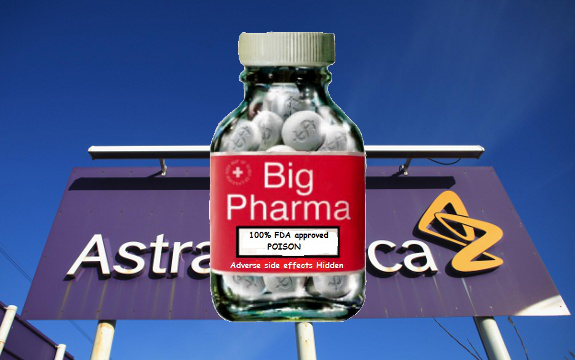FDA’s Own Staff Questions New Ovarian Cancer Drug from Big Pharma

 Biopharmaceutical company AstraZeneca has lied to the public before. They had to pay millions to litigants who suffered from their drug, Seroquel, for example, and consumers have sued them over their misleading drug campaign for Nexium. AstraZeneca’s latest attempt to hoodwink us is evidenced in their attempt to get FDA approval for an experimental ovarian cancer drug, Olaparib. The company claims it can reduce ovarian cancer risk by 83%, but the FDA’s own staff is questioning the claim.
Biopharmaceutical company AstraZeneca has lied to the public before. They had to pay millions to litigants who suffered from their drug, Seroquel, for example, and consumers have sued them over their misleading drug campaign for Nexium. AstraZeneca’s latest attempt to hoodwink us is evidenced in their attempt to get FDA approval for an experimental ovarian cancer drug, Olaparib. The company claims it can reduce ovarian cancer risk by 83%, but the FDA’s own staff is questioning the claim.
Olaparib would be just another cancer drug in the Big Pharma company’s arsenal. It was likely created in defense of a possible $118 billion take-over bid by another lying megacorporation, Pfizer Inc, who recently had to pay one of the biggest fines ever, $2.3 billion, for falsely advertising one of their drugs. Olaparib was meant to take over where chemotherapy fails, and that is often, since chemo isn’t successful at killing cancer. Cancer cells have stem cells that regenerate after chemotherapy, unless they are destroyed in another fashion.
“AstraZeneca has put up some pretty lofty expectations,” said Damien Conover, an analyst at Morningstar.
An FDA report published on their site Monday came two days ahead of a meeting with ‘experts’ to determine if the benefits of this drug outweigh the risks, so that the FDA can determine whether or not to approve the drug. While the FDA does not have to follow the recommendations of its advisory panel, it often does.
Read: 3 Drugs that Made Big Pharma Millions Despite Deadly Risks
Olaparib, which would be sold under the brand name Lynparza if approved, blocks the activity of Poly (ADP-ribose) polymerase (PARP), an enzyme that plays a key role in cell repair.
Patients in a clinical trial had a seven-month median improvement in progression-free survival, a benchmark that measures the amount of time a patient lives while the disease doesn’t get worse, but many cancers return (especially after chemotherapy) after this duration of time.
The drug is aimed at women with certain hereditary BRCA gene mutations that account for an estimated 10-15% of all cases of ovarian cancer, only about 2,000 cases a year in the United States.
A Drug isn’t Needed
There is much fear surrounding the so-called ‘Breast Cancer Associated’ genes, BRCA1 and BRCA2. A natural compound called resveratrol may play a big role in preventing the inactivation of the BRCA-1 gene, and it hardly needs another side-effect laden Big Pharma drug. Of course something that is found easily in blueberries and red grapes can’t be patented. Big Pharma knows this though, and wants to capitalize on synthetic versions of resveratrol so that they can be patented.
Furthermore, the way AstraZeneca has conducted its data analysis, has created some uncertainty about the validity of the results, the FDA review said.
AstraZeneca collected some of the data retrospectively using archived blood samples, calling into question “the reliability of the estimation of treatment effect,” said the review.
The review also said, “. . . there was no difference on overall survival between the two treatment arms.”
AstraZeneca has said sales of Olaparib could reach $2 billion a year. It’s most common side effects were nausea, fatigue, abdominal pain, vomiting, diarrhea and anemia.

Don’t trust the medicines you buy- research them thoroughly first. The status quo now is to release medicines on the flimsiest of ‘research’ – the ONLY motivation is profit. And they tell themselves there’s too many people in the world anyway, so what does it matter if they kill a few thousand